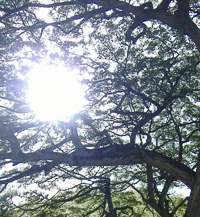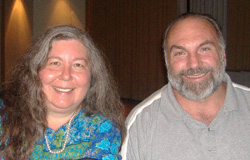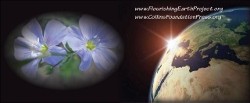This entry was sent to us by Collins Foundation Press contributing authors Jack and Linda Palmer.
 Our food choices have a huge impact on sustainability of the planet. A plethora of research shows that the best human diet for the outcome of our planet is plant-based, fresh (rather than canned or frozen), locally grown, and organically grown. Research clearly shows that this kind of diet requires less water, fertilizer, pesticides, packaging, transportation, and energy. A vegetarian diet not only requires fewer resources to produce, it is also kind to our bodies and to our fellow animals on this planet. A prevailing misconception is that only an omnivorous diet can make a person strong and healthy. Research shows this is an error. A sensible vegetarian diet is easy to do and is very health-giving, significantly reducing rates of cancer, heart disease, type 2 diabetes, and other debilitating lifestyle diseases that have a massive impact on our bodies and healthcare system. In addition, organic, vegetarian farming contributes to the healthiness of the soil, reducing soil depletion and drought potential. Food prepared from scratch at home is more sustainable than eating out. For these and many other reasons, the plant-based diet of fresh, local, home-prepared, organic foods is a significant part of our vision for a sustainable earth.
Our food choices have a huge impact on sustainability of the planet. A plethora of research shows that the best human diet for the outcome of our planet is plant-based, fresh (rather than canned or frozen), locally grown, and organically grown. Research clearly shows that this kind of diet requires less water, fertilizer, pesticides, packaging, transportation, and energy. A vegetarian diet not only requires fewer resources to produce, it is also kind to our bodies and to our fellow animals on this planet. A prevailing misconception is that only an omnivorous diet can make a person strong and healthy. Research shows this is an error. A sensible vegetarian diet is easy to do and is very health-giving, significantly reducing rates of cancer, heart disease, type 2 diabetes, and other debilitating lifestyle diseases that have a massive impact on our bodies and healthcare system. In addition, organic, vegetarian farming contributes to the healthiness of the soil, reducing soil depletion and drought potential. Food prepared from scratch at home is more sustainable than eating out. For these and many other reasons, the plant-based diet of fresh, local, home-prepared, organic foods is a significant part of our vision for a sustainable earth.
Jack A. Palmer, Ph.D., Professor of Psychology, University of Louisiana at Monroe.
Linda K. Palmer, M.S., Writer/Editor, Jiva Institute & Collins Foundation Press
Co-authors: Evolutionary Psychology: The Ultimate Origins of Human Behavior (2001; Allyn & Bacon)
Jack and Linda Palmer are authors or co-authors of “The Wisdom of Virtue: A Scientific Exploration of Honesty, Humility, & Love,” “Power & Restraint: The Question of Human Genetic Engineering,” and “Sustainable Eating,” forthcoming in Science, Wisdom, and the Future: Humanity’s Quest for a Flourishing Earth, published by the Collins Foundation Press (Early Summer 2010)
They are also the co-authors of “Transcending Cultural Indoctrination: Separating the Wheat From the Chaff” in The Evolutionary Epic: Science’s Story and Humanity’s Response, published by the Collins Foundation Press.








